
Andrew Harvey is an author, spiritual teacher, and founder of the Institute of Sacred Activism, dedicated to creating a new world founded in universal compassion and sacred passion for all life.
MOREJoin author and teacher Andrew Harvey on a pilgrimage in honour of Lord Shiva to the great temple sites and spiritual power places of South India.
Join us on a magical journey in the footsteps of the great mystics Ramana Maharshi, Sri Aurobindo and Father Bede Griffiths, whose lives were dedicated to and paved the way for the birth of the divine human. Our leader, Andrew Harvey, is celebrated for his continuation of this work through his books, documentaries, and seminars and, of course, most potently, through pilgrimages like this one. Andrew will share with you teachings and initiations for your own internal transformation and to spread the revolution of the divine human across the world. READ MORE

Andrew Harvey is an author, spiritual teacher, and founder of the Institute of Sacred Activism, dedicated to creating a new world founded in universal compassion and sacred passion for all life.
MOREA spiritual journey of Ascension, divinely orchestrated by Andrew Harvey and Sacred Earth Journeys. Barbara Strassman, Sharon, MA
TESTIMONIALS

Andrew is a master teacher for the challenges of our times. A wise person with an unusual ability to express profound truths, he wove the rich spirituality found in southern India into his teachings. Kristina Wood, Norway
TESTIMONIALS
Tour Description
The holy land of South India has given birth to many saints and sages who have, in return, impregnated the country with their sacredness. There are many shrines, temples and natural monuments (mountains, lakes and more) dedicated to Shiva, embodied divinity, scattered across Tamil Nadu. This is the land of great mystics, where India’s powerful avatar Lord Krishna walked, where Ramana Maharshi made his home, and where Andrew Harvey’s own beloved teacher, Bede Griffiths, created his ashram and lived out his days.

Andrew Harvey’s roots and soul are in and of South India; he was born and spent his formative years here, with her temples and sacred sites as his childhood playgrounds. The South of India is distinct from the North. Sheltered from foreign invaders until the British Raj, it is the true bastion of Hindu traditions. In South India, the caste system was only mildly enforced, resulting in a far friendlier and balanced society.
In this exquisitely crafted pilgrimage, Andrew will introduce deep spiritual practice, while South India’s incredible sites and temples create the perfect space to receive the most stunning visual and sensory experiences.
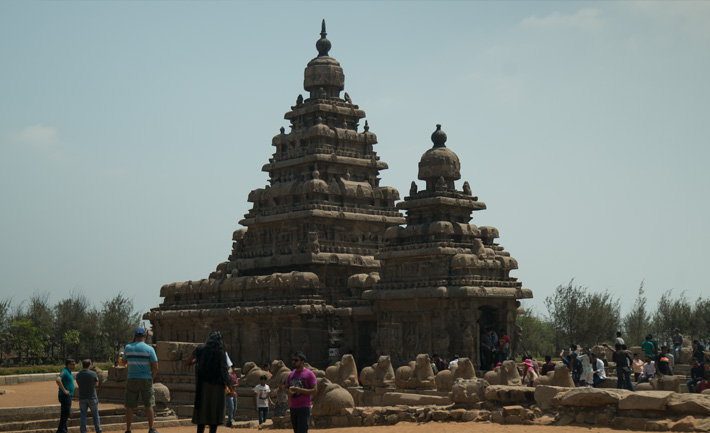
The journey begins in Mahabalipuram with its magnificent Shore Temple and intricate stone carvings, before moving on to the former French territory of Pondicherry (Puducherry), with its distinctive colonial heritage, and home to the Sri Aurobindo Ashram. From here we will visit the progressive, experimental town of Auroville, a manifestation of Sri Aurobindo’s vision, and then on to Chidambaram, the Capital of the Cholas, with its famous Nataraja Temple. In Tanjore (Thanjavur) we will visit the Brihadeshwara Temple, a brilliant example of the major heights achieved by Chola temple architecture. We then change pace with a two-day stay at Shantivanam Ashram, where Father Bede first stayed in 1957-1958 and subsequently took over stewardship in the late 1960s when the Ashram became internationally renowned as a centre of dialogue and renewal. We round out our journey in Tiruvannamalai where Sri Ramana Maharshi lived and meditated for 54 years. Here, we will visit the Arunachaleswarar temple and take a walking tour near Mount Arunachala.
Andrew will share the fruit of his 40-year journey into Hindu mysticism, especially Saivism and its astounding vision of God the dancer. We’ll also dive deep into the evolutionary vision of Sri Aurobindo, and the expansive universal vision of Christ Consciousness that Father Bede Griffiths, the greatest Christian mystic of the 20th century, gave to the world.
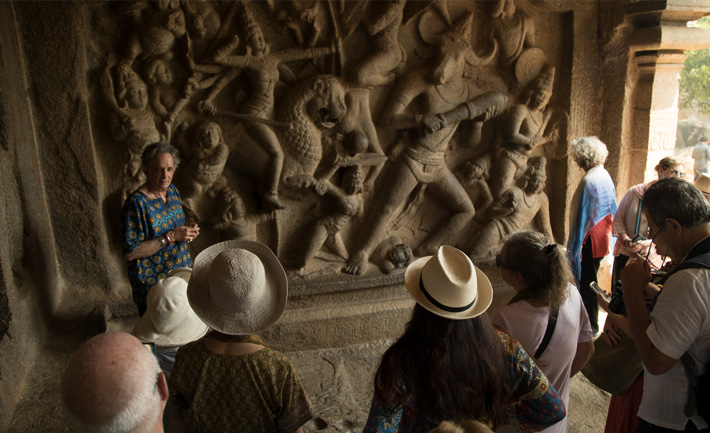
Andrew will discuss the concepts of Sacred Activism and his vision of the contemporary world crisis in both its desperate and positive aspects. Sacred Activism fuses the most profound and grounded mystical knowledge and peace practices with focused, wise, radical action to preserve the environment, ensure human rights, protect all animal species, and transform the political, economic, and cultural systems that engender war and the continuation of obscene and devastating poverty.
Andrew will also bestow essential, powerful practices from the Hindu and Christian traditions to profoundly deepen our experience of sacred India.

There will be many opportunities for connection with the soul of South India and its people through stops for tea, informal meetings, and, of course, the intimate knowledge of our tour leaders. Times for reflection and introspection are equally built into this journey to assist with and allow space for learning and transformation.

To see more photos from one of our past South India journeys with Andrew, see our Flick set: Shiva Dancing: Sacred South India with Andrew Harvey
To view all of the videos from one of our past South India journeys with Andrew, see our YouTube Playlist
Welcome to South India! You will be met at Chennai airport and transferred directly to Mahabalipuram (approx. 1 hr & 15 min drive). Check in and enjoy a well deserved rest! Free time to enjoy the hotel amenities or relax at the pool.
Our hotel is located on the beautiful Coromandel Coast, facing the Bay of Bengal, so you may wish to take a walk on the white-sand beach shaded by casuarinas trees.
This evening we come together for Andrew Harvey’s first fascinating teaching – be prepared to be inspired! We'll also meet our local guide Charles and hear more about the customs and etiquette of the places we will visit.
Afterwards, we enjoy a special Welcome Dinner at the hotel's L’Attitude 49 restaurant, owned by Chindi Varadarajulu, who grew up in Singapore, moved to Vancouver, BC, and there opened the authentically southern Indian restaurant Chutney Villa before calling India home in 2011. This will be a real epicurean treat and immersion into the connection between food and spirituality as well as a fabulous opportunity to connect with your fellow travellers.
(Overnight in Mahabalipuram at Grande Bay Resort & Spa)

After breakfast, we set out on a village tour by auto-rickshaw. This will be a fun and unique opportunity to interact with the locals, get to know about their culture and customs, the country life and its people. Share the road with cows, bullock carts, women carrying water, children playing cricket, street dogs, and more! We'll stop for visits to the village temples, pottery makers, village schools and skirt around the paddy fields.
We'll stop for a delicous traditional lunch on banana leaf. South India has a long-standing tradition of serving food on banana leaves. It is considered quite healthy and auspicious!
(Overnight in Mahabalipuram at Grande Bay Resort & Spa or similar)

After breakfast, we will embark on a sightseeing tour of Mahabalipuram, much of which is a UNESCO World Heritage site. Also known as Mamallapuram, the town is famous for its Shore Temple and was also the second capital and a bustling seaport during the time of the Pallava Kings of Kanchipuram. Ravaged by wind and sea, the temple complex, built in 700-728AD by the Pallava Dynasty, retains its alluring beauty and is a must-see site. We will also visit intricate rock carvings and monuments such as the Descent of the Ganges and the Arjuna’s Penance relief, depicting animals, deities, and other semi-divine creatures.
We will also visit a rock sculpture studio to interact with a master of this traditional art, handed down through the ages.
After sightseeing, we will visit and learn about some local community projects that help physically challenged and less fortunate children and will have the opportunity to support these worthwhile projects.
This evening is at leisure to take a stroll into town for some interesting shopping or simply to relax at the hotel, go for a swim, or enjoy a spa treatment.
(Overnight in Mahabalipuram at Grande Bay Resort & Spa or similar)
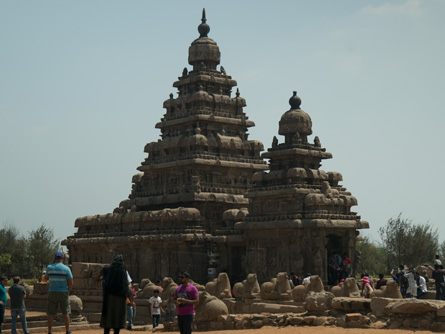
This morning we drive 2-hours to Puducherry, formerly known as Pondicherry, considered the French Riviera of the east, with its French style avenues and many colonial buildings. Puducherry is home to one of the most important ashrams in India, the Sri Aurobindo Ashram, former home of Mother Mirra and Sri Aurobindo. We’ll explore the sites of this coastal city on a sightseeing tour, where we’ll learn more about its history and continued spiritual importance.
Sri Aurobindo was born in Kolkata in the North East of India in 1872; he was a poet, philosopher, yogi, and guru as well as an advocate for Indian independence from British rule. Aurobindo, who passed over in 1950, wrote many important books including theses on human unity, yoga, and “the life divine”; he established the ashram at Pondicherry in 1926, welcoming students from around the world.
This evening we enjoy a Heritage Walk to explore the French quarter of this fascinating town.
(Overnight in Puducherry at Shenbaga Hotel or similar)
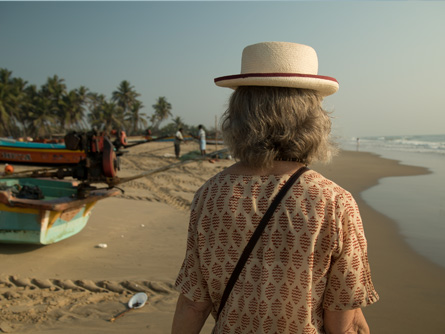
After breakfast we visit Auroville, “The City of Dawn,” an intriguing experimental town. Founded by Mother Mirra Richard in 1968, Auroville manifests Sri Aurobindo’s vision by creating a “universal town where men and women of all countries are able to live in peace and progressive harmony, above all creeds, all politics and nationalities. The purpose of Auroville is to realize human unity.” The Matrimandir is a striking 30-metre high, golden metal globe in the centre of the town, conceived as “a symbol of the Divine’s answer to man’s aspiration for perfection.”
This evening, Andrew will offer another important teaching to help us in our personal transformation. Throughout the journey, Andrew will give talks on the bus and on some evenings back at the hotel. He is excited to share his wealth of knowledge and practice with us!
(Overnight in Puducherry at Shenbaga Hotel or similar)

This morning, we depart on the 2.5 hour journey to Chidambaram, the Capital of the Cholas from AD 907 to 1310. Chidambaram means “sky infused with an atmosphere of intelligence and wisdom” and is derived from the words “chit” and “ambaram.” Chidambaram was ruled by the Pallavas until the 9th century, Medieval Cholas, Later Cholas, Later Pandyas, Vijayanagar Empire, Marathas and the British. According to mythology, it was the precise spot where the Hindu god Shiva once danced in a grove of Tillai trees.
This afternoon, enjoy a beautiful village walk where you will have the opportunity to interact with the local people, get to know more about their daily activities, and visit the local village’s Shiva temple for ceremony and blessings.
(Overnight in Chidambaram at Lakshmi Vilas Heritage Hotel or similar)
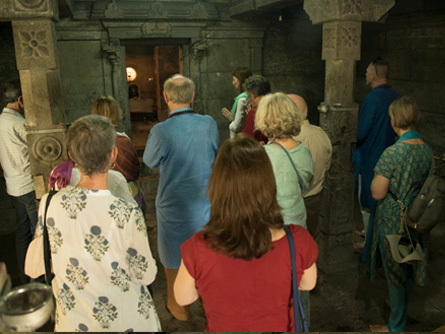
After breakfast, we will head back to the famous Nataraja Temple, dedicated to the dancing Lord Shiva, a favourite deity of the Chola Kings. One legend surrounding its construction suggests that it was built by “the golden-coloured Emperor,” Hiranya Varna Chakravati, who suffered from leprosy. He came to Chidambaram on a pilgrimage from Kashmir in about AD 500. After bathing in the temple tank he was reputed to have recovered from the disease, and as an offering of thanks rebuilt and enlarged the temple. Today, the temple is highly active with impressive ceremonies.
Enjoy some leisure time back at our peaceful heritage hotel, a traditional “landlord’s bungalow” built in 1855 and surrounded by the sounds of birds and nature.
Later, we visit the spectacular and ancient Nataraja Temple again for the evening Puja ceremony – the lighting of candles, sounds of chanting, smells of flowers and incense - an incredible experience at this holy site.
(Overnight in Chidambaram at Lakshmi Vilas Heritage Hotel or similar)
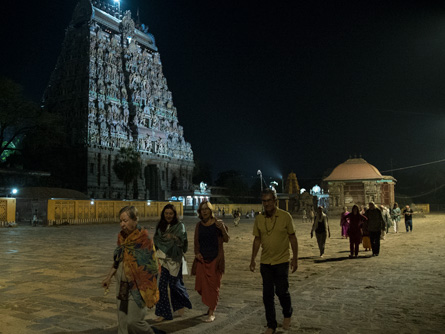
After breakfast, we travel 3 hours to Tanjore, also known as Thanjavur, one of the oldest cities in India and an important centre of South Indian art and architecture. En route we will visit a traditional silk weaving village.
This evening is at leisure to enjoy our beautiful hotel, set on the banks of the Cauvery, South India’s largest river. Go for a swim, have a massage or spa treatment, listen to live traditional Indian music at the outdoor buffet, and enjoy the evening with your fellow travellers.
(Overnight in Tanjore at Ideal River View Resort or similar)

We start the day with a sightseeing tour of Tanjore (Thanjavur), home to most of the Great Living Chola Temples UNESCO World Heritage monuments, the foremost among them being the Brihadeshwara Temple, a brilliant example of the major heights achieved by Chola temple architecture. Known as the “Big Temple,” Brihadeshwara was built by Chola King Raja Raja I (ruled AD 985-1012). The magnificent main temple has a 62-metre vimana, or tower, the tallest in India, topped by a dome carved from an 80-ton block of granite, which needed a 6.5 km ramp to raise it to the top. The attractive gardens, museum, and pristine surroundings make the temple visit a truly rewarding experience.
Afterwards, we visit a nearby village with a history of traditional bronze casting and take the opportunity to view the masters at work using the lost-wax method. This method, used to create sacred temple bronzes during the Chola period, is still practiced today and is being passed down through the generations to ensure that bronze casting continues to thrive.
(Overnight in Tanjore at Ideal River View Resort or similar)

Today, we switch gears and prepare to immerse ourselves in monastery life with a two-day stay at the Shantivanam, or Saccidananda Ashram. Father Bede first stayed at the Ashram in 1957-1958 and then took over stewardship in 1968. Under his charismatic leadership, Shantivanam became an internationally known centre of dialogue and renewal. The aim of Shantivanam has always been to bring the riches of Indian spirituality into Christian life and to share in that profound experience of God that originated in the Vedas, was developed in the Upanishads and Bhagavad Gita, and has come down to us today through a continual succession of sages and holy men and women.
After a 3 hour drive, we arrive at Shantivanam in the early afternoon. Rooms are humble and basic with a small bed covered with mosquito netting and attached bathroom. Simple but delicious vegetarian meals are taken in silence, sitting on the floor in the dining hall (stools are provided for those who cannot sit on the floor), and we wash our own dish afterwards. You are also welcome to help with preparing and serving meals. This change of pace is a welcome opportunity for reflection and spiritual connection.
(Overnight at Shantivanam Ashram)

We spend a second tranquil day at the monastery, with the option of an early morning walk into the village or later by the river. We take all meals at the ashram and respect the allotted times for meditation and prayer. On this pilgrimage to South India, our stay at Shantivanam deepens our understanding of spiritual traditions, and we are honoured to hear the excellent teachings of Brother John Martin and Father Peter, who discuss the commonalities of Hinduism and Christianity.
After dinner, Andrew will give another inspiring talk in the meditation hall.
(Overnight at Shantivanam Ashram)
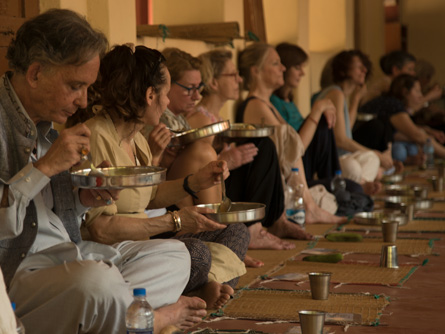
After saying our fond farewells to Shantivanam we drive 5 hours to Tiruvannamalai, where Sri Ramana Maharshi lived and meditated for 54 years. Ramana Maharshi is widely acknowledged as the outstanding Hindu guru of the modern age. He was born in Tamil Nadu in 1879 and made his way to Arunachala at the age of sixteen, not leaving the sacred mountain until his spirit united with it in 1950. Many people witnessed his light entering Arunachala as the life in his body expired.
This afternoon, we will visit the Sri Ramana Maharshi ashram, where you will have the opportunity to see the samadhi shrine of Ramana Maharshi, the spot where he attained Mahasamadhi (left this mortal coil), and the samadhi shrine of his mother, which is known as the Matribhuteshwara Temple. The ashram is peaceful and relaxed, an excellent place for meditation and contemplation. Be sure to visit the bookstore, a treasure-trove of Sri Ramana literature, original works, photographs, videos and more
(Overnight in Tiruvannamalai at Sparsa Resort or similar)
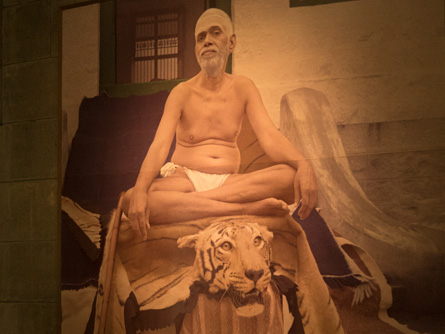
Today we visit Arunachaleswarar temple, thought to be the largest temple in the world dedicated to Shiva, and one of the most captivating temple sites in India, dating from the 11th century. This major pilgrimage centre lies in a striking setting at the foot of the rocky Arunachala Hill and is one of the holiest towns in Tamil Nadu; it is considered the home of Shiva and his consort Parvati. After our visit, you will have free time for independent activities or, if you wish, you can return to the ashram and spend time at the library.
This evening we will walk along the streets at the base of Mount Arunachala . In ancient times, the circumambulation of Arunachala, known as Pradakshana --“pra” signifies the removal of all sins, “da” the fulfillment of all desires, and “shana” the freedom from the cycle of rebirth-- was a popular pilgrimage route. Even though the city has built up around the mountain, still today, we will see offerings at shrines and temples and many sadhus making their way along this sacred pilgrimage route.
(Overnight in Tiruvannamalai at Sparsa Resort or similar)

This morning, we walk up to Virupaksha cave where Ramana Maharshi lived and meditated from 1899 to 1916. This is a powerful place to meditate and reflect on all we have learned on this journey.
This afternoon, enjoy free time at our lovely eco-hotel; go for a swim, have a massage or spa treatment, relax in the beautiful gardens, enjoy a handcrafted chai, or have a parrot tell your fortune! The hotel has many wonderful activities, including yoga.
This evening we gather together for our Farewell Dinner.
(Overnight in Tiruvannamalai at Sparsa Resort or similar)

This morning, we drive 4.5 hours back to Chennai. We can use the restrooms and relax in the lobby of our Chennai hotel to freshen up before continuing on to the airport for evening flights home. If your flight departs in the morning, we can arrange the extra night.
(B = Breakfast; L = Lunch; D = Dinner)
Note: This itinerary is subject to change due to conditions beyond our control.
